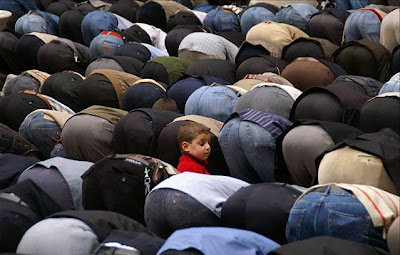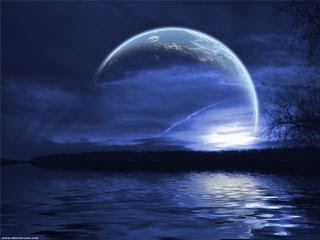What would I do without a mind?
What would I do without a society to shape that mind?
To influence it?
To taint it?
To glorify it?
What would I do without the memories of such glory and such tache?
An orphan on a deserted island, with nothing from the outside world,
save the produce of Nature which surrounds me.
I suppose I would be free....
Sunday, August 23, 2009
Do the Do
Monday, August 17, 2009
Aachoo
If I told you that up to 500,000 people died per year due to a disease and that is mostly in the developed countries, wouldn't you take it seriously?
If I told you that this disease occurs twice a year wouldn't you take it seriously?
If I told you that the disease causing virus keeps getting "better" nearly every year and vaccines have to be continuously modified to accommodate this development, wouldn't you be worried?
If you answered yes to all of the above, then why aren't the news channels and newspapers making a hype about the seasonal flu which has struck nearly every one of us every year? The WHO provides some good information about H1N1. You could find a lot of info about Seasonal Influenza, too, on their site.
Media has made us believe that H1N1 is unusually fatal. This is not true. Media has probably made us believe that this is not curable. This is not true. Media (in India) has made us believe that medicines are the only recourse. This, I believe, is not true (I will explain shortly). Media has also made statements about the inadequacy of medical supplies in India. This appears to be false.
The primary cause of concern is the newness of this virus. Had this been around for a while, people would be less worried. Why? Because the health industry would have come up with a hundred tablets and a couple of vaccines. WHO mentions that standard drugs which are inhibitors of neuraminidase can work, as H1N1 belongs to the family of Influenza type A. There are enough drugs in the market which belong to that category. Don't pop pills. The novelty of this virus has created a panic attack for misplaced reasons. My point is, in spite of the seasonal flu being so common and treated for so many decades, it still kills several thousand people per year! Hence, flu (of any sorts) can be fatal: some for known reasons and some for unsolved reasons. That is the truth (factual).
So why panic about H1N1? Because our helplessness with it is more than with normal seasonal flu. Which means that we can only be worried about the lack of medical advancements. Which implies something that I will not get into in this post.
I have had flu quite a few times in my life and my most commonly employed cure is to do nothing. I would let the fever come, shake up my schedule and go. Most ailments have been handled thus in my life. Doesn't make it the best approach, just something I do. It appears that H1N1 too could be tackled in a similar manner. There are Swine Flu Parties which take this approach to the next level! Has any news channel/newspaper mentioned this possibility? But it is fairly common treatment for seasonal flu. I agree that H1N1 is fairly new (though it also struck in 1918) but most strains of flu are.
I cannot deny that the media has created a wide awareness about H1N1. Nevertheless, I feel that the panic that it has instilled is unwarranted. To report merely on the deaths than all the number of people cured and statistical information creates panic which is pointless. It is important to maintain hygiene but wearing masks is taking things a little farther than required. There is always going to be a virus around. Are we going to wear a mask always?
WHO has marked this pandemic mild to moderate in severity. Medicines exist for this disease. Simple hygiene suffices. It is very easily and methodically curable. The fatality rate is probably on par with any other kind of flu (avian flu is an exception). So, why panic? Why hype this one disease to levels that make it seem as dangerous as an Ebola fever!?
So whose responsibility is it to provide factually correct and educated information to the public? In whom do we place trust? Should the media have a protocol about presenting potentially inciting (for the wrong reasons) information? I still recall the manner in which the Taj hotel incident was covered.
Point is, if our only sources of information are hyped, biased and/or inaccurate, then what do we do?
Thursday, August 13, 2009
Making Mama Proud
I was and still am extremely proud of my little boy going up on stage, confidently adjusting the microphone and then reeling out Urdu the way it should be. Ain't he adorable!? So my mom and his mom (who also happens to be my sis) get to argue about who's son was better on stage at this age! Little boy and me ignore them and watch cartoons! We both agree I was a lot cuter though the brat looks at my collection of his pics and tells me "Mama, I am so cute, no?" Runs in the family, I suppose! :-D I will write a post about how I took to the stage and ate all the lipstick sticks that the teachers had brought along.
Sunday, August 09, 2009
Understanding Duality
How can the divine Oneness be seen? In beautiful forms, breathtaking wonders, awe- inspiring miracles? The Tao is not obliged to present itself this way. It is always present and always available. [When speech is exhausted and mind dissolved, it presents itself. When clarity and purity are cultivated, it reveals itself. When sincerity is unconditional, it unveils itself.] If you are willing to be lived by it, you will see it everywhere, even in the most ordinary things.
If I may intrude with a response to what you have said, here, Pingu,which essentially proclaims that all is the Divine, there is another quote from the Gita where the Supreme declares that the Divine on Earth is what is perfect. Perfection here, as clearly stated in all the verses starting from the 20th to the 40th verse of Chapter 10. Do read all of them starting from this link to later ones.http://www.bhagavad-gita.org/Gita/verse-10-18.html -To give just a glimpse," Of the Vedas, I am the Sama Veda, of the senses, I am the mind, of the commanders I am Kartikeya, of the reservoirs of water I am the ocean, of all the divine sages, I am Narad Muni, of lordly elephants, I am Airavatha, of humans the King, of all the animals I am the lion, of the birds, I am Garuda, of the swift I am the wind, of the wielders of weapons, I am Rama, of the flowing rivers, I am Ganga, of the poetic metres I am Gayathri, of the seasons I am spring, of the Pandavas I am Arjuna, of the sages I am Vyasadeva etc etc." Certainly wherever and whatever is majestic, beautiful or magnificent, you must certainly know that all these manifestations arise from but a fraction of My Glory."# I suspect that there are two fundamental truths of spirituality,one is what you have quoted from Lao Tzu as all is the one Divine Consciousness, and the other is that on Earth and in manifestation this Divine Consciousness is a constantly evolving perfection in time and in space, whereby a present state of 'imperfection' can be criticised or if not criticised or condemned, its inferior qualities as exhibited by its errors and ill consequences in rightness and fairness can be discarded and fairer means that lead to a better harmony, but in truth and rightness can be expounded.1. All is the Divine. This is an essential fundamental truth and an absolute2. All becomes the Divine in the most outward and external manifestation too. This is in time as a growth from a lesser way of being to a more enlightened way. God too becomes in matter and material life.The second fact justifies every single thought, discussion, debate that elucidates more and more, better and better ways to actually enable the Divine that is everything to actually be seen thus in matter too.If mentally I understand that all is the Divine, and hence keep silence or kill my soul when I see ugliness or unfairness, assuming that evil too is the divine, then I disable a chance for me and my context to be redeemed in a greater light.# Maybe the fact that I see unfairness and want it to be mitigated or annulled is also the divine and hence justified...# Sorry, Eroteme, about this too long a response, maybe repetitive too, in your space. But Pingu's comment evoked such a comment from me. Do bear with me...
- Is it possible to stay without an awareness of what happens around us?
- Once we are aware, is it possible to be without recognising it as good or bad?
- Once we recognise something as good or bad, is it possible to not react?
- If we react, is it possible to figure out whether it was meant to be or not?

